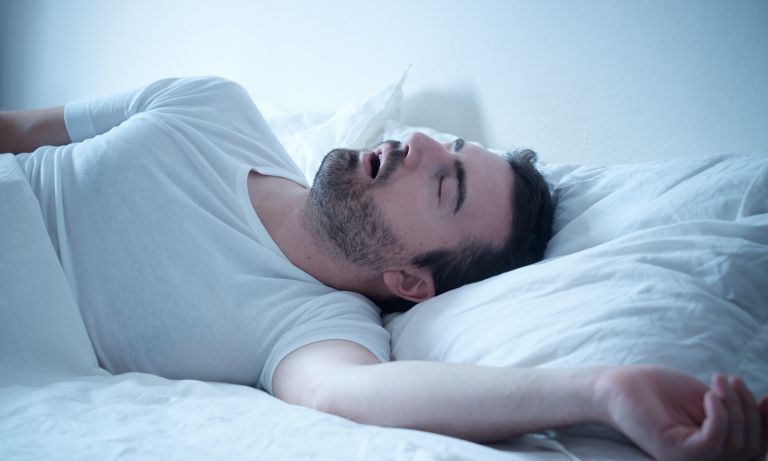
There are several alternative treatments for sleep apnea that you should know about. You can click right here to find out more.
Sleep apnea can leave you feeling tired and like you haven’t got enough energy to get through the day. It can affect your life in many different ways but it can also affect your partner. Sleep apnea often appears to be snoring but can be far more dangerous.
Fortunately, there are many alternative treatments for sleep apnea that can improve the condition and allow you to lead a much healthier lifestyle. Take a look at some of the things that can make a difference.
What is Sleep Apnea?
As mentioned above, sleep apnea often presents itself as snoring. However, some people who suffer from sleep apnea can stop breathing in their sleep. They may wake suddenly, gasping for breath.
Because of this, people with sleep apnea don’t take in enough oxygen as they sleep. This can lead to a variety of different health complications. These can include, mental health issues, increased risk of heart failure, lowered immune function, and memory loss.
There are many medical treatments that can be prescribed to deal with sleep apnea. For instance, breathing equipment, medication and in rare cases, surgery. Here are some methods that may help you avoid medical intervention.
- Keep a Healthy Weight
The best recommendation for anyone suffering from sleep apnea is to maintain a healthy weight. Obesity is a huge contributor to sleep apnea. The extra weight carried in the upper body can put a strain on airways and narrow nasal passages.
Losing just small amounts of weight can decrease the chances of you needing breathing equipment or surgery. In fact, some people have eliminated sleep apnea altogether just by reaching a healthy weight goal.
However, if the weight was to be gained again, the condition is likely to return.
- Gentle Exercise
Regular exercise is recommended for everyone but it can have a significant impact on people with sleep apnea. It may be the last thing you want to do when you feel tired and sluggish but it can improve your energy levels and boost your mood.
It doesn’t have to be intense exercise. A yoga or pilates session once a day is enough to improve the condition. Gentle exercise will promote good circulation for both blood and oxygen.
Breathing exercises and meditation can also improve oxygen levels, allowing you to get a better night’s sleep.
- A Good Mattress
A good mattress is vital for anyone’s sleep but it’s even more important when you suffer from sleep apnea. Your mattress can make all the difference to the amount of rest you get every night.
If your mattress is uneven it can add to your breathing difficulties and you may find yourself tossing and turning during the night, along with a restless sleep because of breathing or snoring.
It’s worth taking a look at the best mattress for sleep apnea and investing in your health and wellbeing.
- Change Positions
Did you know that the position you choose to sleep in can have a dramatic effect on your breathing when you have sleep apnea? Many studies have found that people with sleep apnea who lay on their backs find it more difficult to breathe.
Altering your sleeping position to sleeping on your side, especially if you’re aware that you’re having difficulty with your breathing throughout the night, can relax your breathing.
However, the opposite can be said for children. Children with sleep apnea often find it easier to sleep and breathe properly when sleeping on their backs.
- Cut Out Alcohol and Smoking
If you have sleep apnea and you smoke or drink alcohol, cutting them both from your lifestyle could improve your symptoms dramatically. After consuming alcohol, your throat muscles tend to relax, meaning you have less control over your breathing.
Similarly, it can lead to inflammation in your airways. Smoking works in the same way. It may swell your airways, making it more difficult for you to breathe as you’re sleeping. This will often lead to interrupted sleep and a constant feeling of fatigue.
- Use a Humidifier
Your respiratory system can be affected by dry air. Adding moisture into the air with a humidifier can decrease the symptoms of sleep apnea. A humidifier works to open your airways and decrease congestion, which is why they’re so often used when people have colds.
In addition, you can add essential oils, like lavender or eucalyptus to your humidifier. Both essential oils promote good rest and a calming environment while you sleep. Be sure to clean your humidifier regularly or you could let harmful mold into the air.
- Oral Equipment
There is some sleep equipment that you don’t need a prescription for. For example, tongue stabilizing devices and mandibular advancement devices. These devices place your tongue further towards the opening of your mouth to allow more access from the back of your throat.
These devices come in a range of different specifications. Some cost a small amount and some are more expensive (mainly the devices that you can have custom made).
The Best Alternative Treatments for Sleep Apnea
Alternative treatments for sleep apnea include lifestyle changes that can not only treat symptoms but completely eradicate the condition. It’s worth exploring these treatments in addition to medical advice and treatment in order to get the best outcome.
Do a search online and take a look at some at-home Yoga routines that you can do before bedtime. Getting into the habit of doing these routines could ensure you get a more peaceful night’s sleep.